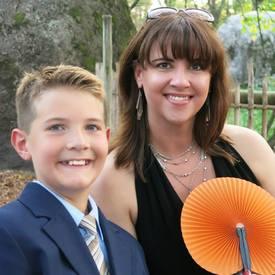Children & Math
My son is learning multiplication and division in school this year. He's the type of boy that just doesn't dig school, he digs sports and competition (if he wins, that is). I loved school and academics, so I'm struggling with his constant whine over homework and lack of desire to try and get decent grades. This is foreign territory to me.
So, any suggestions welcome, but what I'm really looking for are math games that might help and are somewhat challenging... we have:
PC/Laptop
Wii
Kindle Fire
So any games that might work on these devices or internet based, I'd love to hear about. Google brings back so many results it's hard to fish through.
I have workbooks, flashcards, and what-not, but I think a game might engage him a little more.
So, any suggestions welcome, but what I'm really looking for are math games that might help and are somewhat challenging... we have:
PC/Laptop
Wii
Kindle Fire
So any games that might work on these devices or internet based, I'd love to hear about. Google brings back so many results it's hard to fish through.
I have workbooks, flashcards, and what-not, but I think a game might engage him a little more.
0
Replies
-
My kids are freaking weirdos and do math for fun. There's online "work book" sort of things. IXL.com is one. You could have a reward system for him after he completes so many exercises.
Ohh.. another website is www.coolmath-games.com. It's actually games that the kids play.
Good luck to you!!! And I'm glad I read the topic wrong and it wasn't "Children & Meth".0 -
No suggestions, but I wish this was still around:0
-
Khan Academy is fun and free, and has both lessons and problems for math.
Honestly, one of my favorite math games was on Neopets. They have a specific one called Maths Nightmare that is pretty good, and gives you neopoints to take care of your pets with. Maybe Neopets isn't cool enough now though? I'm sure they have other games that can help with math on there too though.0 -
No suggestions, but I wish this was still around:
NUMBER MUNCHERS!!!!0 -
bump0
-
Have you considered helping him make a board game?
Crafts and game-play are always really effective methods for home-learning.0 -
Try combining the multiplication and division with sports. Look at statistics for whatever sport he's into, how they relate to the sport, and how math helps them figure out the stat. Or go practice batting and write down how many times he hits the ball, whether it goes up or down, and play with the numbers later. Compare one day's stats with another day's later that week. Kids are egomaniacs. He might like math better if it shows how awesome he is.0
-
Maybe something like a Mathnasium?
A big reason that I did so well in school was I had an intelligent older sister and we were constantly competitive through grade and middle school as to which of us was smarter.0 -
Have you tried Math Blaster? It's this goofy online thing where you're on a team trying to save the galaxy. The hide math problems in legit platformer games and such. I had the only 90s version when I was a kid and loved it. I would honestly still play it if I could find the disc. They have all kinds of difficulties. Now it's an online game with a membership fee I think, but you do get access to that and all the Jump Start games online. Jump Start's covers all subjects and has some pretty fun games too.0
-
If he's into sports, maybe try looking into sport-themed math games?
Something like this http://mrnussbaum.com/sportsgames/0 -
If you search pinterest there are a lot of great ideas on games you can do with kids to teach math. If you can work in a way for him to teach/explain to you how to do what he's learning that really helps with retention of new skills. Teaching someone else is one of the best ways to learn/make something stick.
http://www.education.com/magazine/article/multiplication-apps/
elearningindustry.com/20-free-multiplication-ipad-apps-for-kids0 -
I love all of you. ALL OF YOU.0
-
Math ≠ Meth.0
-
Math ≠ Meth.
:laugh: :laugh: :laugh:0 -
I don't know, though... meth could fix the problem. :laugh:
 0
0 -
Put them up for adoption and make new ones, win win!0
-
Money. Pennies, nickels, dimes, quarters, and get some fifty cent pieces or even Susan B's to throw in the mix. Tie a monetary reward that directly correlates to his work. In this sense, you will find that correlation equals causation. Worked like a charm for me when I was a kid, and I breezed through math in every grade (except college, but I blame the beer...)
Seriously - tie in rewards /and/ punishments with how much $ you give or how much $ you take away.0 -
loooooved that game!No suggestions, but I wish this was still around:
NUMBER MUNCHERS!!!!0 -
This page has a bunch or resources...
https://catalyst.uw.edu/workspace/ekazemi/1854/96911
Edit to add: Some people say math is a universal language. Others say maths is a universal language. Right there... not a universal language.0 -
Not sure how you'd make it work for multiplication and division, but we used candies for adding/subtracting. (I know, you shouldn't use food for a reward...) but we worked faster and harder so we'd be able to eat the candies at the end of the math lesson...0
-
My younger son was having issues with memorizing his multiplication tables so we made going on here a routine: http://xtramath.org/ (30 minutes after homework). It actually has its own timer and he didn't like having to restart it after it said he was done but he was failing his tests so he had to buckle down. When he started getting better, we cut down to one session before homework and one session after homework. He ended up with 4's on all his math subjects by the end of the year.
It also does division but he didn't need to be drilled on division after learning his multiplication tables.0 -
Since he is such an active child, in my humble opinion, a game might not be the answer.... can you devise a way to combine the math and with sports stats or part of physical games that he plays. Perhaps keep track of how many goals are scored on his team and have him use Player A and Player B, etc etc to multiply their scores. I have a math challenged child and he is very into cooking / helping in the kitchen. We learn our multiplication and division that way. Example: (As I'm cutting bell pepper) If I take these three strips of bell pepper and cut them into 4 pieces each, how many pieces will I have.... wait for his answer.... show him how it's done by cutting. Some children find a tangible experience helpful.0
-
Something like this?
http://www.bbc.co.uk/skillswise/maths/games0 -
Put them up for adoption and make new ones, win win!
OMG OMG OMG!!!
*bouncing up and down* 0
0 -
Since he is such an active child, in my humble opinion, a game might not be the answer.... can you devise a way to combine the math and with sports stats or part of physical games that he plays. Perhaps keep track of how many goals are scored on his team and have him use Player A and Player B, etc etc to multiply their scores. I have a math challenged child and he is very into cooking / helping in the kitchen. We learn our multiplication and division that way. Example: (As I'm cutting bell pepper) If I take these three strips of bell pepper and cut them into 4 pieces each, how many pieces will I have.... wait for his answer.... show him how it's done by cutting. Some children find a tangible experience helpful.
I like it.0 -
Good luck to you!!! And I'm glad I read the topic wrong and it wasn't "Children & Meth".
I'm glad I wasn't the only one :laugh:0 -
Not sure how you'd make it work for multiplication and division, but we used candies for adding/subtracting. (I know, you shouldn't use food for a reward...) but we worked faster and harder so we'd be able to eat the candies at the end of the math lesson...
You would make groups with the candy. It's basically the same principle that the schools use to teach multiplication. "Four groups of three M&M's make how many M&M's all together?"0 -
This content has been removed.
-
Or maybe make a hybrid game of it. Kind of like horse. Do a math problem, shoot a basket, move on when both are completed?0
-
Not sure how you'd make it work for multiplication and division, but we used candies for adding/subtracting. (I know, you shouldn't use food for a reward...) but we worked faster and harder so we'd be able to eat the candies at the end of the math lesson...
You would make groups with the candy. It's basically the same principle that the schools use to teach multiplication. "Four groups of three M&M's make how many M&M's all together?"
In fifth grade, we actually did this in class. We learned fractions and probability that way too. "There are 32 m&ms total. There are 8 red ones. There are 4 blue ones. What is the probability that one randomly selected from the bag will be red? What's the proportion of blue m&ms to red m&ms?" Stuff like that.0
This discussion has been closed.
Categories
- All Categories
- 1.4M Health, Wellness and Goals
- 398K Introduce Yourself
- 44.6K Getting Started
- 261.1K Health and Weight Loss
- 176.4K Food and Nutrition
- 47.7K Recipes
- 233K Fitness and Exercise
- 461 Sleep, Mindfulness and Overall Wellness
- 6.5K Goal: Maintaining Weight
- 8.7K Goal: Gaining Weight and Body Building
- 153.4K Motivation and Support
- 8.4K Challenges
- 1.4K Debate Club
- 96.5K Chit-Chat
- 2.6K Fun and Games
- 4.7K MyFitnessPal Information
- 16 News and Announcements
- 19 MyFitnessPal Academy
- 1.5K Feature Suggestions and Ideas
- 3.2K MyFitnessPal Tech Support Questions





















